- Home
- H. Beam Piper
Four-Day Planet
Four-Day Planet Read online
Produced by Greg Weeks, Sankar Viswanathan, and the OnlineDistributed Proofreading Team at https://www.pgdp.net
Transcriber's Note:
Extensive research did not uncover any evidence that the U.S. copyright on this publication was renewed. The attribution is not a part of the original book.
Four-Day Planet
by H. Beam Piper
SF ace books A Division of Charter Communications Inc. A GROSSET & DUNLAP COMPANY 360 Park Avenue South New York, New York 10010
Copyright (C) 1961 by H. Beam Piper
_Cover art by Michael Whelan_
* * * * *
DEDICATION
For Betty and Vall, withloving remembrance
* * * * *
CONTENTS
1. The Ship from Terra
2. Reporter Working
3. Bottom Level
4. Main City Level
5. Meeting Out of Order
6. Elementary, My Dear Kivelson
7. Aboard the _Javelin_
8. Practice, 50-MM Gun
9. Monster Killing
10. Mayday, Mayday
11. Darkness and Cold
12. Castaways Working
13. The Beacon Light
14. The Rescue
15. Vigilantes
16. Civil War Postponed
17. Tallow-Wax Fire
18. The Treason of Bish Ware
19. Masks Off
20. Finale
* * * * *
Four-Day Planet
1
THE SHIP FROM TERRA
I went through the gateway, towing my equipment in a contragravityhamper over my head. As usual, I was wondering what it would take,short of a revolution, to get the city of Port Sandor as clean andtidy and well lighted as the spaceport area. I knew Dad's editorialsand my sarcastic news stories wouldn't do it. We'd been trying longenough.
The two girls in bikinis in front of me pushed on, still gabblingabout the fight one of them had had with her boy friend, and I closedup behind the half dozen monster-hunters in long trousers, ankle bootsand short boat-jackets, with big knives on their belts. They must haveall been from the same crew, because they weren't arguing about whoseship was fastest, had the toughest skipper, and made the most money.They were talking about the price of tallow-wax, and they seemed tohave picked up a rumor that it was going to be cut another tencentisols a pound. I eavesdropped shamelessly, but it was the samerumor I'd picked up, myself, a little earlier.
"Hi, Walt," somebody behind me called out. "Looking for some newsthat's fit to print?"
I turned my head. It was a man of about thirty-five with curly brownhair and a wide grin. Adolf Lautier, the entertainment promoter. Heand Dad each owned a share in the Port Sandor telecast station, andsplit their time between his music and drama-films and Dad'snewscasts.
"All the news is fit to print, and if it's news the _Times_ printsit," I told him. "Think you're going to get some good thrillers thistime?"
He shrugged. I'd just asked that to make conversation; he never hadany way of knowing what sort of films would come in. The ones the_Peenemuende_ was bringing should be fairly new, because she wasoutbound from Terra. He'd go over what was aboard, and trade one forone for the old films he'd shown already.
"They tell me there's a real Old-Terran-style Western been showing onVoelund that ought to be coming our way this time," he said. "It wasfilmed in South America, with real horses."
That would go over big here. Almost everybody thought horses were asextinct as dinosaurs. I've seen so-called Westerns with the cowboysriding Freyan _oukry_. I mentioned that, and then added:
"They'll think the old cattle towns like Dodge and Abilene were awfulsissy places, though."
"I suppose they were, compared to Port Sandor," Lautier said. "Are yougoing aboard to interview the distinguished visitor?"
"Which one?" I asked. "Glenn Murell or Leo Belsher?"
Lautier called Leo Belsher something you won't find in the dictionarybut which nobody needs to look up. The hunters, ahead of us, heardhim and laughed. They couldn't possibly have agreed more. He was goingto continue with the fascinating subject of Mr. Leo Belsher's ancestryand personal characteristics, and then bit it off short. I followedhis eyes, and saw old Professor Hartzenbosch, the principal of theschool, approaching.
"Ah, here you are, Mr. Lautier," he greeted. "I trust that I did notkeep you waiting." Then he saw me. "Why, it's Walter Boyd. How is yourfather, Walter?"
I assured him as to Dad's health and inquired about his own, and thenasked him how things were going at school. As well as could beexpected, he told me, and I gathered that he kept his point ofexpectation safely low. Then he wanted to know if I were going aboardto interview Mr. Murell.
"Really, Walter, it is a wonderful thing that a famous author like Mr.Murell should come here to write a book about our planet," he told me,very seriously, and added, as an afterthought: "Have you any ideawhere he intends staying while he is among us?"
"Why, yes," I admitted. "After the _Peenemuende_ radioed us theirpassenger list, Dad talked to him by screen, and invited him to staywith us. Mr. Murell accepted, at least until he can find quarters ofhis own."
There are a lot of good poker players in Port Sandor, but ProfessorJan Hartzenbosch is not one of them. The look of disappointment wouldhave been comical if it hadn't been so utterly pathetic. He'd beenhoping to lasso Murell himself.
"I wonder if Mr. Murell could spare time to come to the school andspeak to the students," he said, after a moment.
"I'm sure he could. I'll mention it to him, Professor," I promised.
Professor Hartzenbosch bridled at that. The great author ought to becoming to his school out of respect for him, not because aseventeen-year-old cub reporter sent him. But then, ProfessorHartzenbosch always took the attitude that he was conferring a favoron the _Times_ when he had anything he wanted publicity on.
The elevator door opened, and Lautier and the professor joined in thepush to get into it. I hung back, deciding to wait for the next one sothat I could get in first and get back to the rear, where my hamperwouldn't be in people's way. After a while, it came back empty and Igot on, and when the crowd pushed off on the top level, I put myhamper back on contragravity and towed it out into the outdoor air,which by this time had gotten almost as cool as a bake-oven.
I looked up at the sky, where everybody else was looking. The_Peenemuende_ wasn't visible; it was still a few thousand milesoff-planet. Big ragged clouds were still blowing in from the west,very high, and the sunset was even brighter and redder than when I hadseen it last, ten hours before. It was now about 1630.
Now, before anybody starts asking just who's crazy, let me point outthat this is not on Terra, nor on Baldur nor Thor nor Odin nor Freya,nor any other rational planet. This is Fenris, and on Fenris thesunsets, like many other things, are somewhat peculiar.
Fenris is the second planet of a G_{4} star, six hundred and fiftylight-years to the Galactic southwest of the Sol System. Everythingelse equal, it should have been pretty much Terra type; closer to acooler primary and getting about the same amount of radiation. Atleast, that's what the book says. I was born on Fenris, and have neverbeen off it in the seventeen years since.
Everything else, however, is not equal. The Fenris year is a trifleshorter than the Terran year we use for Atomic Era dating, eightthousand and a few odd Galactic Standard hour
s. In that time, Fenrismakes almost exactly four axial rotations. This means that on one sidethe sun is continuously in the sky for a thousand hours, pouring downunceasing heat, while the other side is in shadow. You sleep eighthours, and when you get up and go outside--in an insulated vehicle, oran extreme-environment suit--you find that the shadows have moved onlyan inch or so, and it's that much hotter. Finally, the sun crawls downto the horizon and hangs there for a few days--periods of twenty-fourG.S. hours--and then slides slowly out of sight. Then, for about ahundred hours, there is a beautiful unfading sunset, and it's reallypleasant outdoors. Then it gets darker and colder until, just beforesunrise, it gets almost cold enough to freeze CO_{2}. Then the suncomes up, and we begin all over again.
You are picking up the impression, I trust, that as planets go, Fenrisis nobody's bargain. It isn't a real hell-planet, and spacemen haven'tmade a swear word out of its name, as they have with the name offluorine-atmosphere Nifflheim, but even the Reverend Hiram Zilker, theOrthodox-Monophysite preacher, admits that it's one of those planetsthe Creator must have gotten a trifle absent-minded with.
The chartered company that colonized it, back at the end of the FourthCentury A.E., went bankrupt in ten years, and it wouldn't have takenthat long if communication between Terra and Fenris hadn't been amatter of six months each way. When the smash finally came, twohundred and fifty thousand colonists were left stranded. They losteverything they'd put into the company, which, for most of them, wasall they had. Not a few lost their lives before the Federation SpaceNavy could get ships here to evacuate them.
But about a thousand, who were too poor to make a fresh startelsewhere and too tough for Fenris to kill, refused evacuation, tookover all the equipment and installations the Fenris Company hadabandoned, and tried to make a living out of the planet. At least,they stayed alive. There are now twenty-odd thousand of us, and whilewe are still very poor, we are very tough, and we brag about it.
There were about two thousand people--ten per cent of the planetarypopulation--on the wide concrete promenade around the spaceportlanding pit. I came out among them and set down the hamper with mytelecast cameras and recorders, wishing, as usual, that I could findsome ten or twelve-year-old kid weak-minded enough to want to be areporter when he grew up, so that I could have an apprentice to helpme with my junk.
As the star--and only--reporter of the greatest--and only--paper onthe planet, I was always on hand when either of the two ships on theTerra-Odin milk run, the _Peenemuende_ and the _Cape Canaveral_,landed. Of course, we always talk to them by screen as soon as theycome out of hyperspace and into radio range, and get the passengerlist, and a speed-recording of any news they are carrying, from thelatest native uprising on Thor to the latest political scandal onVenus. Sometime the natives of Thor won't be fighting anybody at all,or the Federation Member Republic of Venus will have somenonscandalous politics, and either will be the man-bites-dog story toend man-bites-dog stories. All the news is at least six months old,some more than a year. A spaceship can log a light-year in sixty-oddhours, but radio waves still crawl along at the same old 186,000 mps.
I still have to meet the ships. There's always something that has tobe picked up personally, usually an interview with some VIP travelingthrough. This time, though, the big story coming in on the_Peenemuende_ was a local item. Paradox? Dad says there is no suchthing. He says a paradox is either a verbal contradiction, and you getrid of it by restating it correctly, or it's a structuralcontradiction, and you just call it an impossibility and let it go atthat. In this case, what was coming in was a real live author, who wasgoing to write a travel book about Fenris, the planet with thefour-day year. Glenn Murell, which sounded suspiciously like a nom deplume, and nobody here had ever heard of him.
That was odd, too. One thing we can really be proud of here, besidesthe toughness of our citizens, is our public library. When people haveto stay underground most of the time to avoid being fried and/orfrozen to death, they have a lot of time to kill, and reading is oneof the cheaper and more harmless and profitable ways of doing it. Andtravel books are a special favorite here. I suppose because everybodyis hoping to read about a worse place than Fenris. I had checked onGlenn Murell at the library. None of the librarians had ever heard ofhim, and there wasn't a single mention of him in any of the bigcatalogues of publications.
The first and obvious conclusion would be that Mr. Glenn Murell wassome swindler posing as an author. The only objection to that was thatI couldn't quite see why any swindler would come to Fenris, or whathe'd expect to swindle the Fenrisians out of. Of course, he could beon the lam from somewhere, but in that case why bother with all thecover story? Some of our better-known citizens came here dodgingwarrants on other planets.
I was still wondering about Murell when somebody behind me greeted me,and I turned around. It was Tom Kivelson.
Tom and I are buddies, when he's in port. He's just a shade older thanI am; he was eighteen around noon, and my eighteenth birthday won'tcome till midnight, Fenris Standard Sundial Time. His father is JoeKivelson, the skipper of the _Javelin_; Tom is sort of juniorengineer, second gunner, and about third harpooner. We went to schooltogether, which is to say a couple of years at ProfessorHartzenbosch's, learning to read and write and put figures together.That is all the schooling anybody on Fenris gets, although JoeKivelson sent Tom's older sister, Linda, to school on Terra. Anybodywho stays here has to dig out education for himself. Tom and I werestill digging for ours.
Each of us envied the other, when we weren't thinking seriously aboutit. I imagined that sea-monster hunting was wonderfully thrilling andromantic, and Tom had the idea that being a newsman was real hotstuff. When we actually stopped to think about it, though, we realizedthat neither of us would trade jobs and take anything at all for boot.Tom couldn't string three sentences--no, one sentence--together tosave his life, and I'm just a town boy who likes to live in somethingthat isn't pitching end-for-end every minute.
Tom is about three inches taller than I am, and about thirty poundsheavier. Like all monster-hunters, he's trying to grow a beard, thoughat present it's just a blond chin-fuzz. I was surprised to see himdressed as I was, in shorts and sandals and a white shirt and a lightjacket. Ordinarily, even in town, he wears boat-clothes. I lookedaround behind him, and saw the brass tip of a scabbard under thejacket. Any time a hunter-ship man doesn't have his knife on, he isn'twearing anything else. I wondered about his being in port now. I knewJoe Kivelson wouldn't bring his ship in just to meet the _Peenemuende_,with only a couple of hundred hours' hunting left till the storms andthe cold.
"I thought you were down in the South Ocean," I said.
"There's going to be a special meeting of the Co-op," he said. "Weonly heard about it last evening," by which he meant after 1800 ofthe previous Galactic Standard day. He named another hunter-shipcaptain who had called the _Javelin_ by screen. "We screened everybodyelse we could."
That was the way they ran things in the Hunters' Co-operative. SteveRavick would wait till everybody had their ships down on the coast ofHermann Reuch's Land, and then he would call a meeting and pack itwith his stooges and hooligans, and get anything he wanted votedthrough. I had always wondered how long the real hunters were going tostand for that. They'd been standing for it ever since I couldremember anything outside my own playpen, which, of course, hadn'tbeen too long.
I was about to say something to that effect, and then somebody yelled,"There she is!" I took a quick look at the radar bowls to see whichway they were pointed and followed them up to the sky, and caught atiny twinkle through a cloud rift. After a moment's mental arithmeticto figure how high she'd have to be to catch the sunlight, I relaxed.Even with the telephoto, I'd only get a picture the size of a pinhead,so I fixed the position in my mind and then looked around at thecrowd.
Among them were two men, both well dressed. One was tall and slender,with small hands and feet; the other was short and stout, with ascrubby gray-brown mustache. The slender one had a bulge under hisleft arm,
and the short-and-stout job bulged over the right hip. Theformer was Steve Ravick, the boss of the Hunters' Co-operative, andhis companion was the Honorable Morton Hallstock, mayor of PortSandor and consequently the planetary government of Fenris.
They had held their respective positions for as long as I couldremember anything at all. I could never remember an election in PortSandor, or an election of officers in the Co-op. Ravick had a bunch ofgoons and triggermen--I could see a couple of them loitering in thebackground--who kept down opposition for him. So did Hallstock, onlyhis wore badges and called themselves police.
Once in a while, Dad would write a blistering editorial about one orthe other or both of them. Whenever he did, I would put my gun on, andso would Julio Kubanoff, the one-legged compositor who is the thirdmember of the Times staff, and we would take turns making sure nobodygot behind Dad's back. Nothing ever happened, though, and that alwaysrather hurt me. Those two racketeers were in so tight they didn't needto care what the Times printed or 'cast about them.
Hallstock glanced over in my direction and said something to Ravick.Ravick gave a sneering laugh, and then he crushed out the cigarette hewas smoking on the palm of his left hand. That was a regular trick ofhis. Showing how tough he was. Dad says that when you see somebodyshowing off, ask yourself whether he's trying to impress other people,or himself. I wondered which was the case with Steve Ravick.
Then I looked up again. The _Peenemuende_ was coming down as fast asshe could without over-heating from atmosphere friction. She wasalmost buckshot size to the naked eye, and a couple of tugs weregetting ready to go up and meet her. I got the telephoto camera outof the hamper, checked it, and aimed it. It has a shoulder stock andhandgrips and a trigger like a submachine gun. I caught the ship inthe finder and squeezed the trigger for a couple of seconds. It wouldbe about five minutes till the tugs got to her and anything elsehappened, so I put down the camera and looked around.
Coming through the crowd, walking as though the concrete under him waspitching and rolling like a ship's deck on contragravity in a storm,was Bish Ware. He caught sight of us, waved, overbalanced himself andrecovered, and then changed course to starboard and bore down on us.He was carrying about his usual cargo, and as usual the manifest wouldread, _Baldur honey-rum, from Harry Wong's bar_.
Bish wasn't his real name. Neither, I suspected, was Ware. When he'dfirst landed on Fenris, some five years ago, somebody had nicknamedhim the Bishop, and before long that had gotten cut to one syllable.He looked like a bishop, or at least like what anybody who's neverseen a bishop outside a screen-play would think a bishop looked like.He was a big man, not fat, but tall and portly; he had a ruddy facethat always wore an expression of benevolent wisdom, and the morecargo he took on the wiser and more benevolent he looked.
He had iron-gray hair, but he wasn't old. You could tell that by thebacks of his hands; they weren't wrinkled or crepy and the veinsdidn't protrude. And drunk or sober--though I never remembered seeinghim in the latter condition--he had the fastest reflexes of anybody Iknew. I saw him, once, standing at the bar in Harry Wong's, knockover an open bottle with his left elbow. He spun half around, grabbedit by the neck and set it up, all in one motion, without spilling adrop, and he went on talking as though nothing had happened. He wasquoting Homer, I remembered, and you could tell that he was thinkingin the original ancient Greek and translating to Lingua Terra as hewent.
He was always dressed as he was now, in a conservative black suit, thejacket a trifle longer than usual, and a black neckcloth with an Ullerorganic-opal pin. He didn't work at anything, but quarterly--onceevery planetary day--a draft on the Banking Cartel would come in forhim, and he'd deposit it with the Port Sandor Fidelity & Trust. Ifanybody was unmannerly enough to ask him about it, he always said hehad a rich uncle on Terra.
When I was a kid--well, more of a kid than I am now--I used to believehe really was a bishop--unfrocked, of course, or ungaitered, orwhatever they call it when they give a bishop the heave-ho. A lot ofpeople who weren't kids still believed that, and they blamed him onevery denomination from Anglicans to Zen Buddhists, not even missingthe Satanists, and there were all sorts of theories about what he'ddone to get excommunicated, the mildest of which was that somewherethere was a cathedral standing unfinished because he'd hypered outwith the building fund. It was generally agreed that hisecclesiastical organization was paying him to stay out there in theboondocks where he wouldn't cause them further embarrassment.
I was pretty sure, myself, that he was being paid by somebody,probably his family, to stay out of sight. The colonial planets arefull of that sort of remittance men.
Bish and I were pretty good friends. There were certain old ladies, ofboth sexes and all ages, of whom Professor Hartzenbosch was anexample, who took Dad to task occasionally for letting me associatewith him. Dad simply ignored them. As long as I was going to be areporter, I'd have to have news sources, and Bish was a dandy. He knewall the disreputable characters in town, which saved me having toassociate with all of them, and it is sad but true that you get veryfew news stories in Sunday school. Far from fearing that Bish would bea bad influence on me, he rather hoped I'd be a good one on Bish.
I had that in mind, too, if I could think of any way of managing it.Bish had been a good man, once. He still was, except for one thing.You could tell that before he'd started drinking, he'd really beensomebody, somewhere. Then something pretty bad must have happened tohim, and now he was here on Fenris, trying to hide from it behind abottle. Something ought to be done to give him a shove up on his feetagain. I hate waste, and a man of the sort he must have been turninghimself into the rumpot he was now was waste of the worst kind.
It would take a lot of doing, though, and careful tactical planning.Preaching at him would be worse than useless, and so would simplytrying to get him to stop drinking. That would be what Doc Rojansky,at the hospital, would call treating the symptoms. The thing to do wasmake him want to stop drinking, and I didn't know how I was going tomanage that. I'd thought, a couple of times, of getting him to work onthe Times, but we barely made enough money out of it for ourselves,and with his remittance he didn't need to work. I had a lot of otherideas, now and then, but every time I took a second look at one, itgot sick and died.

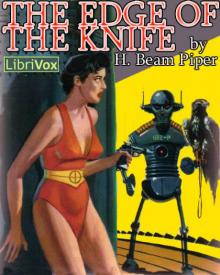 The Edge of the Knife
The Edge of the Knife Genesis
Genesis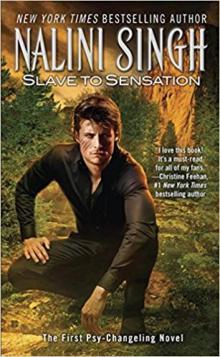 A Slave is a Slave
A Slave is a Slave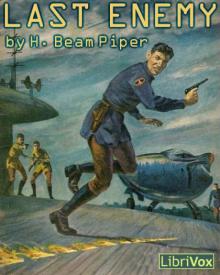 Last Enemy
Last Enemy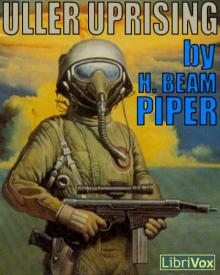 Uller Uprising
Uller Uprising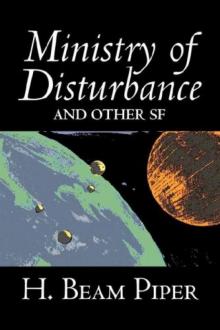 Ministry of Disturbance
Ministry of Disturbance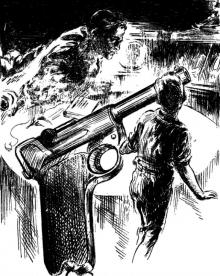 Time and Time Again
Time and Time Again The Mercenaries
The Mercenaries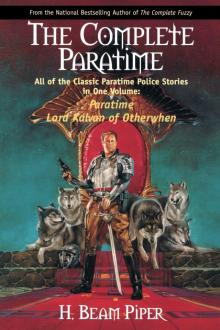 Police Operation
Police Operation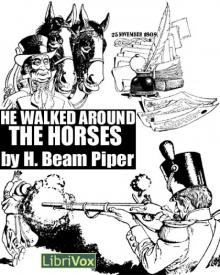 He Walked Around the Horses
He Walked Around the Horses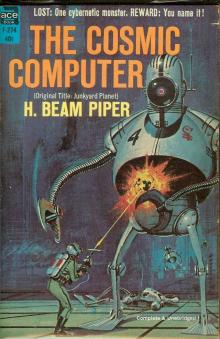 Time Crime
Time Crime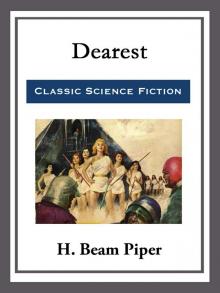 Dearest
Dearest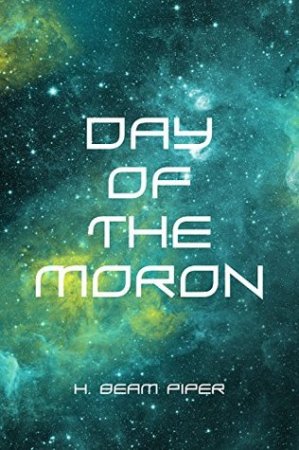 Day of the Moron
Day of the Moron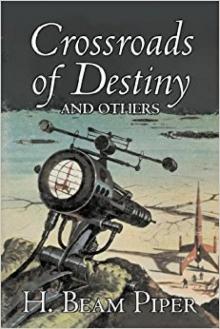 Crossroads of Destiny
Crossroads of Destiny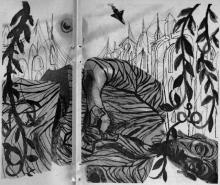 Graveyard of Dreams
Graveyard of Dreams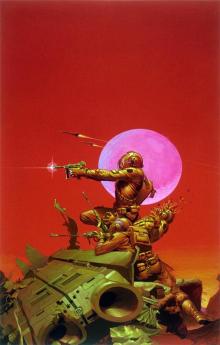 The Cosmic Computer
The Cosmic Computer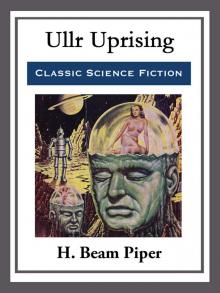 Ullr Uprising
Ullr Uprising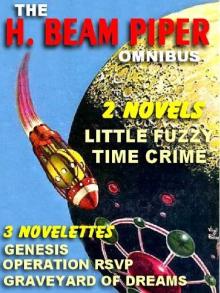 Operation R.S.V.P.
Operation R.S.V.P.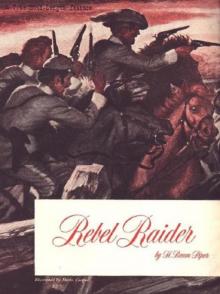 Rebel Raider
Rebel Raider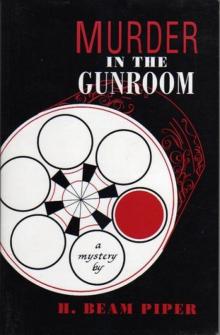 Murder in the Gunroom
Murder in the Gunroom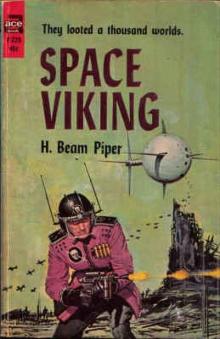 Space Viking
Space Viking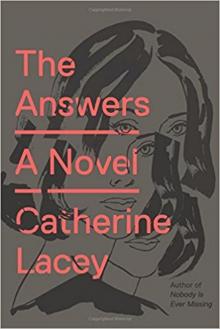 The Answer
The Answer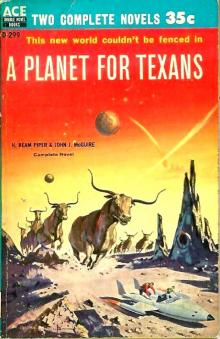 A Planet for Texans (aka Lone Star Planet)
A Planet for Texans (aka Lone Star Planet)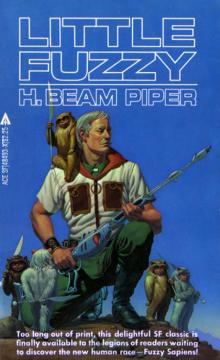 Little Fuzzy
Little Fuzzy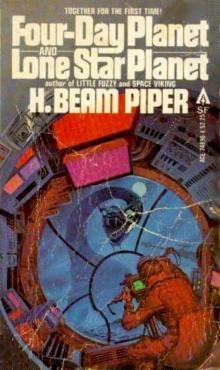 Four-Day Planet
Four-Day Planet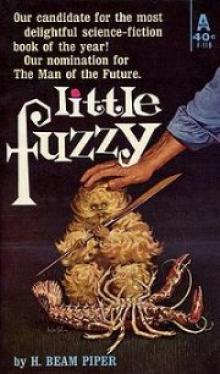 Little Fuzzy f-1
Little Fuzzy f-1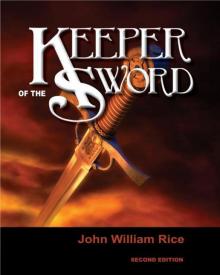 Keeper
Keeper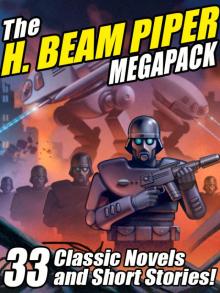 The H. Beam Piper Megapack
The H. Beam Piper Megapack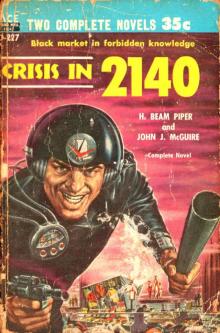 H. Beam Piper
H. Beam Piper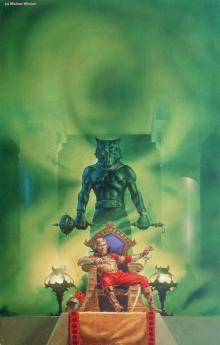 Lord Kalvan of Otherwhen
Lord Kalvan of Otherwhen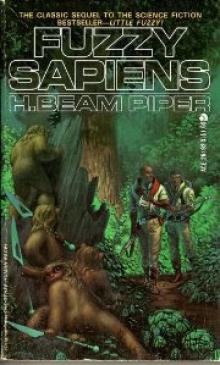 Fuzzy Sapiens f-2
Fuzzy Sapiens f-2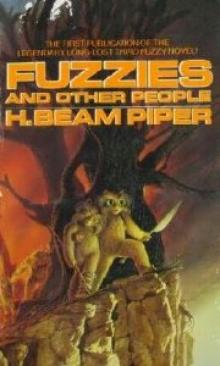 Fuzzies and Other People f-3
Fuzzies and Other People f-3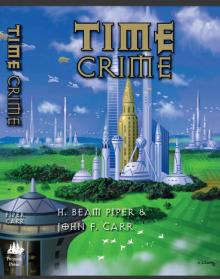 TIME PRIME
TIME PRIME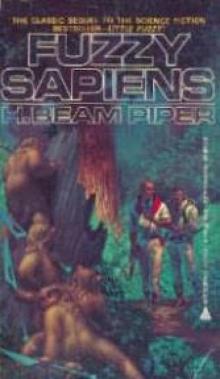 Fuzzy Sapiens
Fuzzy Sapiens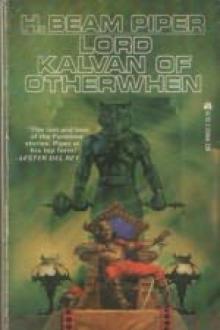 Lord Kalvan of Otherwhen k-1
Lord Kalvan of Otherwhen k-1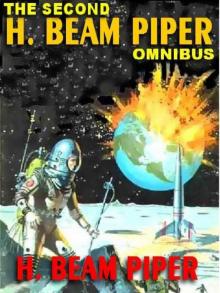 The Second H. Beam Piper Omnibus
The Second H. Beam Piper Omnibus